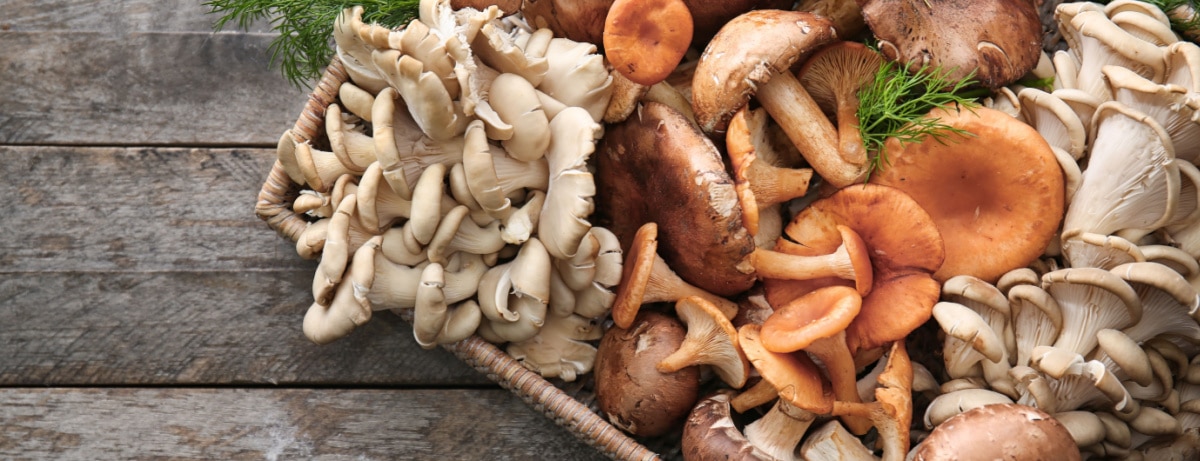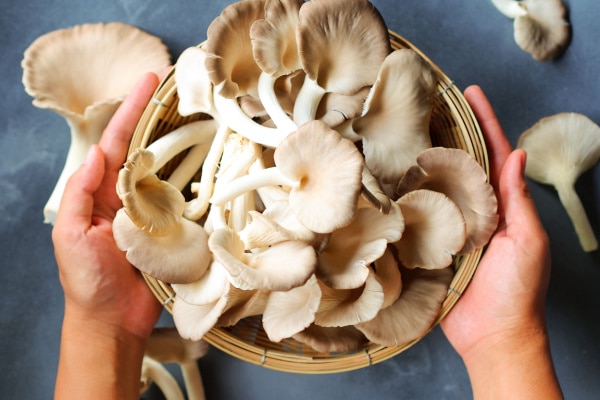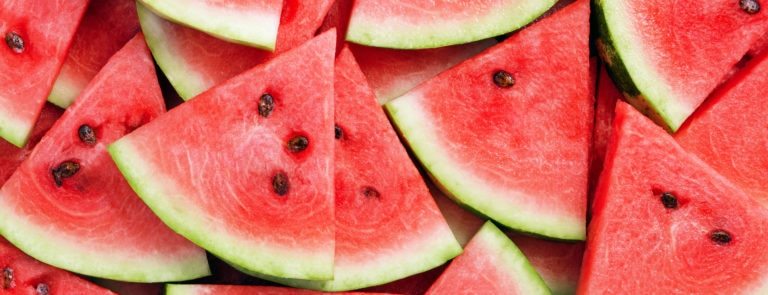B&C
|Carousel main title
Main title
Guide to oyster mushrooms

Mushrooms are taking the wellness world by storm, and there’s no wonder. Delicious and packed with nutrients, it's believed that there's so much more to these edible fungi than meets the eye.
Oyster mushrooms are one of the most cultivated types of mushrooms in the world, and their popularity has only increased in recent years. With their light texture and mild flavour, oyster mushrooms have been used in recipes for centuries, but it’s thought they could hold some potential health benefits too.1
Here we’ll give you the lowdown on all you need to know about oyster mushrooms, their possible benefits, side effects and more.
Skip to: What are oyster mushrooms? | How to identify oyster mushrooms | The nutritional value of oyster mushrooms | Possible oyster mushroom benefits | Potential oyster mushroom side effects | How to cook oyster mushrooms | Cooking king oyster mushrooms | The final say
Oyster mushrooms, or Pleurotus ostreatus, are a family of edible gilled mushrooms with a large, fleshy, fan-shaped appearance and a short stem. Their caps often have a frilly edge and resemble their namesake, oysters.2
These white mushroom oysters are very common in woodlands in the UK as they like to grow in clusters on hardwood, deciduous trees like beech, earning them the nickname ‘tree mushrooms’.3 They also grow well in many other countries worldwide and have become a popular ingredient in many Chinese, Japanese and Korean recipes, where they're highly valued for their soft texture and mild, nutty flavour.4
Oyster mushrooms are one of the few species known to be carnivorous, as they can kill a species of tiny worms called nematodes to get more nitrogen in their diet.5 6
How many species are there?
How many species are there?
There are over 40 species of oyster mushrooms, but the most common are7:
- King oyster mushrooms
- Pink oyster mushrooms
- Pearl oyster mushrooms
- Blue oyster mushrooms
- Golden oyster mushrooms


Containing a variety of plant compounds, oyster mushrooms have been used in traditional medicine practices for many years, so many people believe in their possible health benefits.8
Oyster mushrooms are generally easy to identify. They have a pale grey or white cap and a frilly edge that rolls inward slightly. Underneath, you’ll see they have crowded white gills that run from the cap edge down the stem. Their stems are short, usually only a few centimetres long and have a fluffy appearance.9
False oyster mushroom identification is possible. So, before touching or eating any mushroom you find, make sure you check what it is across multiple sources and that you're 100% confident about what kind of mushroom it is. If in doubt, leave it well alone!
Handpicked Content: Poisonous muhrooms to avoid
When it comes to nutrition, oyster mushrooms contain a wide range of essential vitamins and minerals, like potassium, magnesium, and B vitamins, as well as lots of antioxidants.10 Oyster mushrooms are also low in calories, fat, and cholesterol. 100g of oyster mushrooms contain11:
- 33 calories
- 3.31g of protein
- 6.09g of carbohydrates
- 2.3g of fibre
- 0.41g of fat
The possible benefits of oyster mushrooms
Rich in many nutrients, it’s thought that oyster mushrooms may hold a range of benefits for your health. However, it's important to note that research is still developing regarding whether oyster mushrooms can benefit your health.
Here are 4 potential oyster mushroom health benefits:
1
They may be high in antioxidants
Oyster mushrooms are believed to be a good source of antioxidants, which can help protect your body’s cells from damage caused by free radicals.12
2
They may help lower cholesterol
Some research suggests that oyster mushrooms contain beta-glucans which can help reduce cholesterol production in your body. But more research is needed here.13 14
3
They may help regulate your blood sugar
In 2020, scientists reviewed previous research that attributed oyster mushrooms to controlling blood sugar. They suggested that the beta-glucans in oyster mushrooms may be the cause as they help to slow down digestion and absorption. However, research is still developing here.15
4
They may help to support your immune system
Research has shown potential links between oyster mushrooms and your immune system. They believe that oyster mushrooms help to activate infection-fighting molecules in your body. However, more research is needed here.16
The potential side effects of oyster mushrooms
The potential side effects of oyster mushrooms
There's very little information on whether oyster mushrooms are safe for everyone, so it's essential to always check with a doctor before adding oyster mushrooms to your diet, particularly if you're taking any medication.
Most research conducted into oyster mushrooms is limited, as is the knowledge of potential side effects. As with any food product there's always a risk of allergies, so if you react to oyster mushrooms in any way, you should stop consuming them.


If you know you have a mushroom allergy or are sensitive to them, you should avoid oyster mushrooms altogether.
Oyster mushrooms are sometimes thought to cause mild stomach aches or nausea, so making sure you take a safe dose is important. You should also always stick to the recommended serving size, usually stated on the packaging.
If you’re pregnant or breastfeeding, it's recommended that you steer clear of oyster mushrooms because there isn't enough information available for it to be considered safe.
Oyster mushrooms can come in many forms, like fresh or dried. You can eat raw oyster mushrooms, which are a great addition to salads, but sometimes they can have a slight metallic taste if they’re uncooked.
Cooking oyster mushrooms is simple, and when cooked, they have a subtle flavour and a velvet-like texture. These mushrooms are so versatile that the best way to cook oyster mushrooms is by sautéing, braising, roasting and frying or simply adding them to stir-fries as a meat alternative – the choice is yours!
Here are some ways you can cook up oyster mushrooms to add to your diet:
- Stir fry some oyster mushrooms and add them to your favourite pasta or risotto
- Braise them and add them to a hearty soup or stew
- Use a skewer and grill or roast them
- Sauté them and add them to your favourite sauces
- Cover them in a crispy coating and fry them for a tender yet delicious snack or appetiser
Unlike regular oyster mushrooms, oyster king mushrooms have a larger stalk, with a meaty texture and strong umami flavour that is stronger once cooked. Their unique taste means an oyster king mushroom is a perfect addition to dishes with intense flavours, like garlic.17
You’ll find king oyster mushrooms listed as ingredients in many delicious Chinese or Japanese dishes, as they are treasured for their unique taste and texture. Often likened to types of seafood like scallops, king oyster mushrooms make a great addition to many vegetarian dishes.
Showcase the robust flavours of king oyster mushrooms by frying them lightly in a pan, serving them up whole, or covering them in a tempura batter and frying them up for the perfect side dish.
From their unique flavour and texture to their potential health benefits, oyster mushrooms are undoubtedly a great addition to any diet. So, why not whip up a batch of delicious oyster mushrooms and try them out today?
- https://www.ncbi.nlm.nih.gov/pmc/articles/PMC4244211/
- https://www.sciencedirect.com/science/article/abs/pii/S0308814621021774
- https://www.mushroomcouncil.com/mushroom-101/varieties/oyster/
- https://link.springer.com/article/10.1007/s11557-019-01515-0
- https://www.woodlandtrust.org.uk/trees-woods-and-wildlife/fungi-and-lichens/oyster-mushroom/
- https://www.nytimes.com/2023/01/18/science/oyster-mushrooms-carnivorous-toxins.html
- https://oyster-mushroom.com/types-of-oyster-mushrooms/
- https://pubmed.ncbi.nlm.nih.gov/25685150/
- https://www.wildlifetrusts.org/wildlife-explorer/fungi/oyster-mushroom
- https://www.proquest.com/openview/0bc912dd24764658d936509664f64170/1?pq-origsite=gscholar&cbl=1966353
- https://fdc.nal.usda.gov/fdc-app.html#/food-details/168580/nutrients
- https://www.hsph.harvard.edu/nutritionsource/antioxidants/
- https://www.ncbi.nlm.nih.gov/pmc/articles/PMC5618555/
- https://pubmed.ncbi.nlm.nih.gov/23104078/
- https://www.ncbi.nlm.nih.gov/pmc/articles/PMC7230384/
- https://www.ncbi.nlm.nih.gov/pmc/articles/PMC5067930/
- https://scholars.tari.gov.tw/bitstream/123456789/12264/1/50-4-5.pdf










